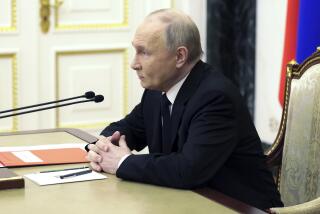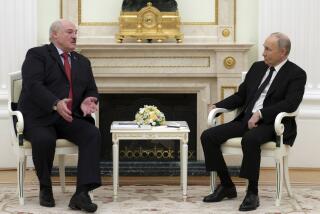Russia agrees to ‘de-escalation’ plan for Ukraine at Geneva talks
Russia staved off further Western sanctions over its support for separatist militants in eastern Ukraine by reaching an agreement with the top U.S., European and Ukrainian diplomats that aims to “de-escalate” tensions between the former Soviet republics without committing Russia to stay out of its neighbors domestic affairs.
Russian Foreign Minister Sergei Lavrov told the state-run Itar-Tass news agency that the four powers meeting in Geneva had signed a document calling for “national dialogue” in Ukraine to iron out divisive differences between the European-leaning western half of the country and the eastern regions where a large ethnic Russian minority supports continued alliance with Moscow.
The four-party agreement came as something of a surprise from the meeting, convened while tensions have been soaring in eastern Ukraine as Russian-speaking gunmen hold dozens of Ukrainian government sites and the ineffectual Ukrainian military has been unable to drive out the pro-Moscow militants.
In Moscow, Russian President Vladimir Putin reminded Russians and the rest of the world that he reserved the right to invade Ukraine to protect the local citizenry.
“We know quite well that we must do our best to protect their rights and help them independently decide their fate and we will struggle for that,” Putin said during his annual call-in show in a Moscow television studio. “I remind you that the Federation Council of Russia [the upper house of Parliament] empowered the president to use the armed forces in Ukraine.”
President Obama had warned on the eve of the Geneva talks that Russia would face stepped-up sanctions if it continued what Western officials see as a campaign to destabilize eastern Ukraine and create a pretext for invasion.
“What I have said consistently is that each time Russia takes these kinds of steps that are designed to destabilize Ukraine or violate their sovereignty that there are going to be consequences,” Obama said in an interview Wednesday with CBS News.
Russia has amassed about 40,000 troops on the Ukrainian border and pro-Russia militants have seized government buildings in about a dozen towns and cities in eastern Ukraine. The gunmen claim to be protecting the population from what they cast as a dangerous and illegitimate leadership in the capital, Kiev.
The deal, as reported by Lavrov, makes no mention of Russia pulling back its troops, which the Kremlin has said are in the region for military exercises.
Lavrov said the Geneva agreement provides for the disarming of any “illegal armed groups” in Ukraine in return for amnesty for the militants as long as they haven’t committed “grave crimes.” It also requires that “all administrative buildings must be returned to their legitimate owner,” he said.
A European Union statement on the Geneva agreement gave a more detailed account of the steps to be taken to ease tensions, including the removal of all barricades and obstructions on public streets.
The apparent compromise should buy some time for Ukraine to try to work out a new governing structure for the country without the disruption of Kremlin-allied gunmen occupying government buildings and thwarting normal public functions. But it does little to change the status quo of a menacing Russian military presence just over the eastern border.
Ukraine’s interim government had already raised the prospect of talks to reconfigure the national government, and the United States and European Union were probably eager to support the Geneva plan as a means of putting off the difficult and potentially divisive subject of targeting sanctions on Russia where it would most hurt: its vital energy trade. European countries are Russia’s biggest customers for oil and gas, and any boycott would create major supply problems for Western Europe.
Kremlin officials have been claiming since former Ukrainian President Viktor Yanukovich was toppled by a rebellion in late February that the opposition figures now in power in Kiev lack legitimacy and any authority to act in the name of Ukrainian citizens.
Lavrov’s signing off on the Geneva agreement may be seen as de facto recognition of the interim Ukrainian leadership in exchange for its willingness to engage in negotiations to transform the unitary state structure into a federation that would cede more power to the regions.
What shape any new system of government would take wasn’t specified in the agreement, leaving some maneuvering room for Kiev and Moscow. Russia has been pushing for a highly decentralized federation that would allow the regions to set their own economic and foreign policies -- effectively giving the Kremlin veto power through its allied eastern proxies over any decisions by Ukraine’s national government that Moscow opposes.
The crisis in Ukraine was provoked by deep divisions between the country’s eastern and western regions over whether to enter an association agreement with the European Union or remain integrated in Moscow’s emerging rival bloc, the Eurasian Union.
Twitter: @cjwilliamslat
Times staff writers Sergei L. Loiko in Moscow and Kathleen Hennessey in Washington contributed to this report.
More to Read
Start your day right
Sign up for Essential California for news, features and recommendations from the L.A. Times and beyond in your inbox six days a week.
You may occasionally receive promotional content from the Los Angeles Times.







